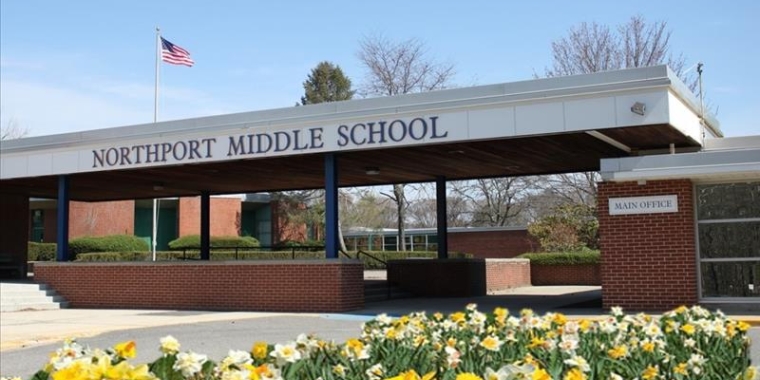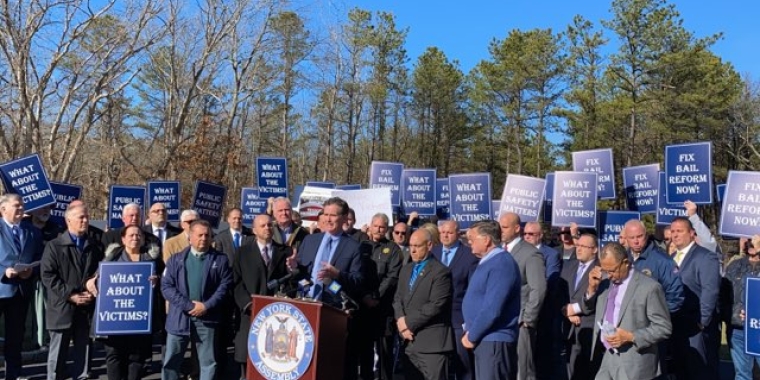
Senator Flanagan Honors 70th Anniversary of D-Day
John J. Flanagan
June 6, 2014
-
ISSUE:
- Veterans

Senator John Flanagan (2nd Senate District) joined with his colleagues in the New York State Senate to honor our World War II veterans by adopting a resolution that commemorates the 70th anniversary of the Allied Army invasion of Normandy on June 6, 1944. This defining day in world history marked the beginning of the liberation of Europe and the eventual end of World War II.
The Senate also passed a package of legislation to benefit veterans, as well as the men and women on active military duty.
“The term ‘the Greatest Generation’ aptly reflects the dedication and commitment of the brave soldiers who fought to protect the freedoms all Americans enjoy today. On June 6, 1944, those on the front lines in the fight against tyranny turned the tide of the war and altered world history. Their efforts brought peace back to our nation and it is my privilege to join with my colleagues to honor their heroism,” stated Senator Flanagan.
Senator William J. Larkin Jr., a World War II veteran and sponsor of the resolution, said: “The Americans who fought on D-Day, and throughout the war, made history with their courage and brave actions. The cost of freedom proved to be very, very high. Every soldier that was killed or wounded, and every one that survives today, helped save the world. They truly deserve to be recognized, honored and remembered. I take great pride in welcoming fellow World War II veterans to the Senate Chamber today.”
The Senate resolution described the extraordinary impact of D-Day: On June 6, 1944, the military might of the Allies combined for the most extensive aerial and sea borne assault ever planned; the D-Day Invasion at the beaches of Normandy, France changed the direction of World War II, and the history of the twentieth century; planned for over two years by the Allied Forces, the D-Day Invasion was an intricate coordination of the world's greatest military forces, and an exercise in cooperation that marked the turning point of the war, and the world's history.
On June 6, 1944, 160,000 troops from the United States, Great Britain and Canada landed on the French coastline at Normandy to fight Nazi Germany. More than 6,500 ships and landing craft, as well as 13,000 aircraft participated in the attack. By the end of that day, the Allies established a foot-hold in Normandy. During the D-Day invasion more than 9,000 Allied soldiers were killed or wounded.
The Senate’s adoption of the D-Day resolution was accompanied by an exhibit that includes historical photos and video footage, informational panels, and a display of military equipment and memorabilia that were used by American Armed Forces at the time of the D-Day invasion.
In addition to the resolution and exhibit, the Senate passed the following legislation to benefit veterans:
Tax Relief for Veterans
S3931: extends the alternative veterans' property tax exemption by local option to active members of the military. Currently, only honorably discharged veterans are eligible for the exemption.
S4136A: honors disabled veterans who sacrificed their health and wellbeing for the safety of our country by authorizing local governments to provide a property tax exemption to 100-percent-disabled veterans who served in a combat theatre or combat zone of operations, or their unmarried surviving spouses.
S6429: authorizes local governments to create a property tax exemption for active duty military forces and reservists that are ordered to active duty.
S6781: encourages more school districts to authorize a veterans’ property tax exemption by giving school districts the authority to repeal the benefit in the event of a negative change to the district’s economic circumstances. Some districts have not enacted the tax exemptions for veterans because of concerns it could not be reversed in the future if the need arose.
S1435: assists active duty combat veterans by allowing municipalities to grant the additional combat veteran property tax exemption to persons who have been discharged from the service, then re-enlisted, served in combat, and are now returned and residing in New York State, but have not yet been again discharged. Soldiers who have returned to New York from combat in places like Iraq and Afghanistan, but who have not yet been discharged from service, have found that although they are eligible for the regular 15 percent veterans’ exemption as a result of their earlier discharge, they are not eligible for the additional 10 percent combat exemption because they have not been discharged from their subsequent service.
S3572A: exempts certain non-profit veterans organizations from tax on non-highway diesel motor fuel used for heating purposes.
Expanding Veterans’ Benefits
S6821: provides a 60-day stay of suspension and revocation of licenses and registrations of military service personnel while on active duty, and would additionally reverse in absentia convictions of vehicle and traffic violations of such military service personnel while on active duty, without prejudice for refiling.
S1963: allows those with military service and an honorable discharge to attend classes at the State University of New York (SUNY) and the City University of New York (CUNY) on a tuition-free audit basis.
S1978: makes college more affordable for those in military service by including active duty and honorably discharged veterans who attend college under the new GI bill within the definition of resident for in-state tuition eligibility at community colleges and state-aided four-year colleges.
S1051: changes the eligibility dates for a military service recognition scholarship to include conflicts that occurred after June 1, 1982, including Lebanon (1982), Grenada (1983), and Libya (1986).
S7617A: allows veterans holding a federal Golden Access Passport or federal Access Pass to be able to access state recreational facilities free of charge.
S5735A: requires the Division of Veteran Affairs to maintain a fact sheet on their website containing contact information for all veterans’ integrated service networks located within the state and contact information for the United States veterans health administration. Hospitals will then be required to provide veteran patients with a copy of the fact sheet maintained by the division.
Honoring Veterans and their Families
S6160: authorizes the adjutant general of the State of New York to present a medal known as the “New York State Korean War Service Medal.”
S6161: authorizes the adjutant general of the State of New York to present a medal known as the “New York State Vietnam War Service Medal.”
S4198: establishes a “Bronze Star Recipient” and “Silver Star Recipient” license plate to be issued by the Department of Motor Vehicles upon proof that the applicant is a Bronze or Silver Star recipient, or the spouse of a recipient. The DMV already issues plates for Purple Heart recipients.
S970A: establishes a “gold star father” distinctive license plate to the father or the spouse of a father of a fallen soldier. A “gold star mother” plate has been available since 1991.
S3554: upon surrendering a set of “gold star mother” license plates, this bill would allow the gold star mother to keep and retain one of the plates for commemorative purposes.
S7122: creates a “New York State Veterans Remembrance” license plate that can be issued to a veteran or spouse of a veteran.
S3869: provides legal protections for veterans memorials in New York State by establishing official recognition for the importance these memorials serve in honoring the sacrifices of our veterans. The bill is in response to actions taken by some municipalities and school districts that removed war memorials from their property without providing for the preservation, moving or replacement of the memorial.
Earlier this session, the Senate approved veterans legislation including the following measures:
S6865 (signed into law): creates the "Service-Disabled Veteran-Owned Business Act" to ensure New York’s service-connected disabled- veteran owned small businesses are better able to compete for millions of dollars in state contracts by creating a six percent state contract set-aside.
S2655A: protects the voting rights of active duty service members who make the ultimate sacrifice by requiring that the ballots of deceased military personnel be counted toward the election for which they were cast.
S2652 : authorizes local governments to allow a veteran, or the unremarried surviving spouse of a veteran, who was receiving a veterans exemption on real property within the county (or New York City) to continue to receive the exemption if they move to a new home within the same county (or within New York City).
S3507A: removes the issue of military deployment as a factor in the consideration for awarding child custody when a suitable child care plan is presented.
Share this Article or Press Release
Newsroom
Go to NewsroomNorthport Middle School Information
January 29, 2020

Suffolk Rallies To Restore Sanity To Bail System
January 24, 2020


